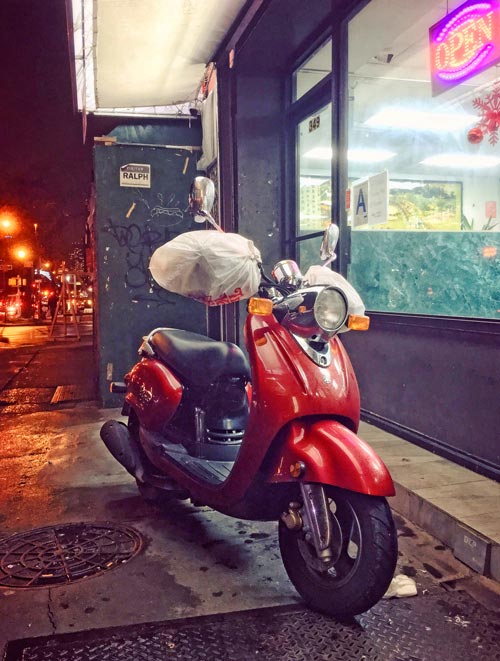
A New York City council member has asked the state attorney general to open an antitrust investigation into online food ordering and delivery service Grubhub.
In a letter last month addressed to AG Letitia James, Mark Gjonaj, the head of the City Council’s Committee on Small Business, writes that the “time may have come” to revisit the terms of a 2013 settlement agreement that permitted Grubhub to acquire Seamless. Gjonaj writes: “I do believe that Grubhub’s outsized market share and heavy-handed tactics could lead to artificially reduced competition which in turn may drive up the commissions paid by struggling locally owned restaurants.”
The news comes just two weeks after a New Food Economy report alleged that Grubhub has been quietly buying up thousands of web domains in restaurants’ names without their knowledge or permission. While Grubhub denied those allegations, saying that provisions in their contracts make clear that Grubhub provides such a service, that hasn’t stopped the recent wave of public scrutiny as more and more restaurant owners accuse services like Grubhub of charging businesses excessively high fees.
At a June City Council hearing, an antitrust lawyer testified that Grubhub currently has “substantial monopoly power” in New York City and controls up to 69 percent of the market. The lawyer, Gregory Frank, noted that, “Grubhub’s use of its monopoly power on the food ordering side of business to increase market power on the food delivery side, that could potentially be illegal.”
Grubhub, meanwhile, called the accusations incorrect. “We operate in a dynamic, hyper-competitive sector that has changed dramatically in the past few years and will continue to do so. We face intense competition in New York City and throughout the country,” noted a Grubhub spokesperson.

Senate Minority Leader Chuck Schumer, D-N.Y., also singled out Grubhub, calling for greater oversight after allegations of unfair trade practices. The senior New York senator was reacting to recent reports that the delivery app company had improperly charged restaurants fees even when an order had not taken place.
Councilman Mark Gjonaj, the New York City lawmaker spearheading the push to regulate Grubhub, said it goes beyond just bogus fees.
“These mom-and-pop shops have an unfair disadvantage,” Gjonaj added. “They’re competing against billion-dollar venture capital-invested companies. The fee structure is up to 33% of the total charges, and we know [their] profits are 6% to 12%. On every order, there is a net loss to these small businesses.”
In one of Grubhub’s example pricing breakdowns, the company says it charges a 20% marketing commission, 10% delivery commission and roughly 3% processing fee to the restaurant on every order. That amounts to upwards of a third of the total revenue to the restaurants. Grubhub notes that commission rates are negotiable.
Gjonaj recently escalated the fight against Grub by petitioning New York Attorney General Letitia James to open up an antitrust investigation into the company. Grub holds nearly 70% market share in New York City, according to research firm Second Measure, its largest footprint in the U.S. “We’re still dealing with all the stakeholders and we’re trying to determine the best course of action, if any,” said Gjonaj. “We hope that [Grub] first steps up to the plate and [does] the right thing by refunding any fees that shouldn’t have been charged to small businesses to begin with. And then from there, we’re looking at the fee structure, we’re looking at the potential of an antitrust violation, if one exists.”
New York City is leading the charge in what Gjonaj hopes will expand into a nationwide effort to level the playing field between delivery app companies and their restaurant partners. The New York City Council held a late-June hearing with local restaurateurs to address accusations of phantom fees and allegations it had created fake websites for restaurants to drive sales through the platform. Grubhub has disputed both these claims.
“It should be to no one’s surprise that New York is taking this lead. This is the first hearing in the country. This is going to involve city, state, and federal branches that come together to address this issue, but we hear it on the streets from our local stores,” said Gjonaj.
A Grubhub spokesperson noted that the company welcomes “the opportunity to work with Senator Schumer, the U.S. Small Business Administration, and others to show our proven commitment to the restaurant community” and to disprove the “flagrantly inaccurate narrative that our business practices are misleading or lack transparency.”

























